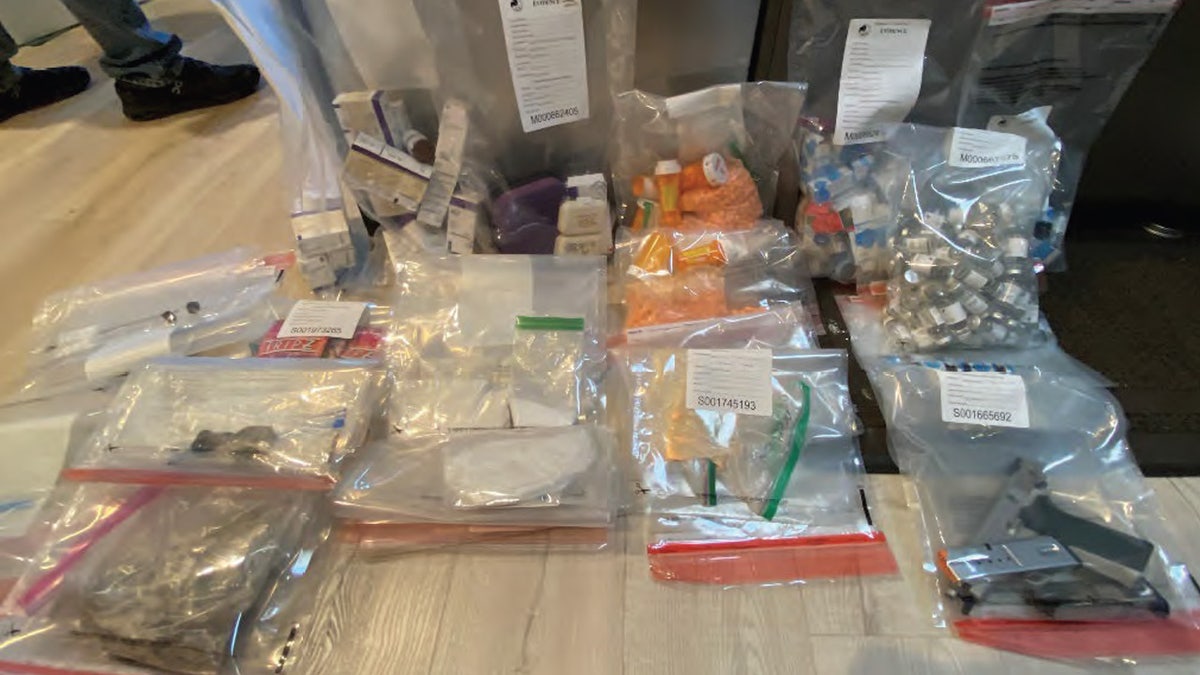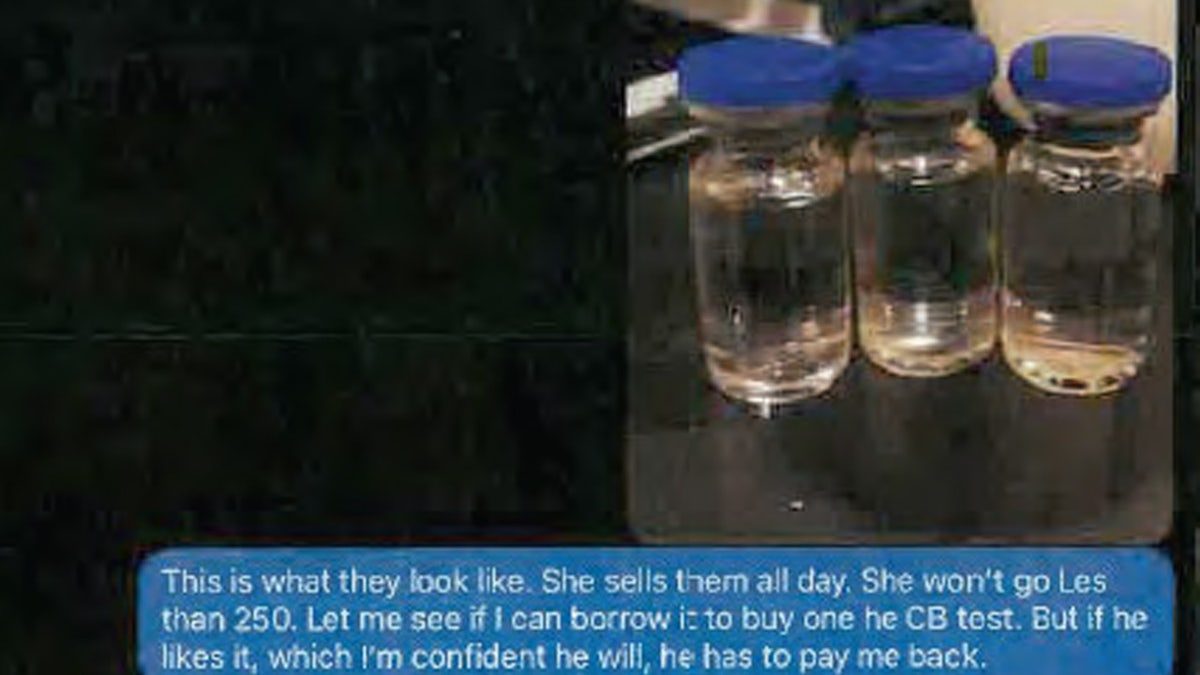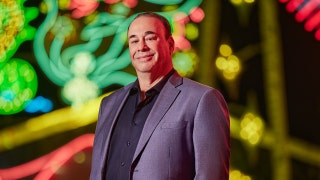Matthew Perry has brought ‘public attention’ to the US’s ketamine problem Dr. Houman Hemmati
Board-certified MD Dr. Houman Hemmati breaks down the latest information on Matthew Perry’s ‘very tragic’ death on ‘Fox News @ Night.’
The use of the nickname "Ketamine Queen" to refer to the woman charged in connection to Matthew Perry's ketamine overdose has sparked a legal debate.
While the move was "strategic," the inclusion of the nickname "risks unfairly prejudicing the jury," Duncan Levin, Harvey Weinstein's former defense attorney, told Fox News Digital.
Jasveen Sangha, referred to as the "Ketamine Queen" in multiple court documents related to the case, was charged with one count of conspiracy to distribute ketamine. She was also charged with one count of maintaining a drug-involved premises, one count of possession with intent to distribute methamphetamine, one count of possession with intent to distribute ketamine and five counts of distribution of ketamine.
However, Sangha's legal team shut down the idea that she had ever met Perry, who died Oct. 28 after an apparent ketamine overdose.

Jasveen Sangha was arrested and charged with multiple offenses in Matthew Perry's death. (Jojo Korsh/BFA.com / Shutterstock)
"My client never met Matthew Perry, has nothing to do with Matthew Perry and all the supposed rumors otherwise are just that, urban legend," Mark Geragos, Sangha's lawyer, told ABC7.
Geragos criticized the U.S. Attorney's Office for using "Ketamine Queen" to refer to Sangha in the indictment.
"I admire the cleverness of it," he said. "I don't think it has any place in an indictment."
"In the end, while it may grab attention, it also opens the door for claims of prosecutorial misconduct or unfair labeling."
"We never claimed to have given her the 'Ketamine Queen' nickname. That is something her customers – Erik Fleming, included – did," the U.S. Attorney's Office told the outlet.
The nickname "paints the defendant in a highly negative light before any evidence is even presented, suggesting a central role in drug-related crimes," Levin, who is not involved in Sangha's case, explained.
"The defense will likely argue that it's inflammatory and irrelevant, especially if the name came from someone else, as it could bias jurors and shift their focus from the facts. In the end, while it may grab attention, it also opens the door for claims of prosecutorial misconduct or unfair labeling."

Jasveen Sangha, the "Ketamine Queen," rented a home in North Hollywood for the purpose of manufacturing, storing, and distributing controlled substances, according to the indictment. (United States Attorney's Office)
MATTHEW PERRY DEATH PROBE REVEALS ACTOR WAS MANIPULATED BY ‘LEECHES’ IN HIS INNER CIRCLE
The U.S. Attorney's Office accused Sangha of providing the fatal dose of ketamine to Perry through her middleman, Erik Fleming, and the actor's assistant, Kenneth Iwamasa.
Iwamasa had begun to look for additional sources of ketamine as Perry's addiction spiraled out of control, authorities claimed. Fleming, who was acquainted with Perry through a mutual friend, was introduced to Sangha through an unidentified person with the intention of obtaining ketamine.
Fleming and Sangha communicated about the price and quantity of ketamine through text messages, according to court documents.
"Just got this from my person," Fleming later wrote to Perry's assistant in text messages included in Iwamasa's plea agreement documents. "She only deal[s] with high end and celebs. If it were not great stuff she’d lose her business."

Erik Fleming described the ketamine available to Matthew Perry and his assistant, Kenneth Iwamasa, in texts shown in the indictment. (United States Attorney's Office)
Sangha's nickname was "appropriate" to include in the indictment, former federal prosecutor Neama Rahmani told Fox News Digital. However, the West Coast Trial Lawyers founder claimed bringing it up now was just a ploy to "win the public relations battle."
Rahmani added, "It's probably too late for that."
"At trial, the defense will try to exclude it if the probative value of the evidence is outweighed by its prejudicial effect," he explained. "It may come down to whether Sangha marketed herself as the ketamine queen. If so, it’s an admission of a defendant and will probably come in."
WATCH: MATTHEW PERRY HAS BROUGHT ‘PUBLIC ATTENTION’ TO THE KETAMINE PROBLEM IN THE U.S.
Sangha, allegedly maintained a stash house located in North Hollywood, California, which she used for "manufacturing, storing, and distributing controlled substances, including methamphetamine, a Schedule II controlled substance, and ketamine, a Schedule III controlled substance," according to court documents.
The ketamine allegedly provided by Sangha and delivered to Iwamasa by Fleming killed Perry on Oct. 28.
That morning, Perry's assistant administered a shot of ketamine to the actor around 8:30 a.m. By 12:45 p.m., Perry had instructed Iwamasa to give him another injection while the "Friends" star watched a movie. Roughly 40 minutes later, Perry requested another injection, allegedly telling Iwamasa, "Shoot me up with a big one," according to the plea agreement.
The live-in assistant administered a third injection to Perry while the 54-year-old was near or in a Jacuzzi. Iwamasa then left the home to run errands for Perry. When he returned, the assistant found Perry "face down" in the Jacuzzi, deceased.
Perry's death was caused by "acute effects of ketamine," according to his autopsy completed on Oct. 29. Drowning, coronary artery disease and buprenorphine effects were listed as contributing factors.
LIKE WHAT YOU’RE READING? CLICK HERE FOR MORE ENTERTAINMENT NEWS

Matthew Perry died in October 2023 from "acute effects of Ketamine." (Gregg DeGuire/Getty Images)
The nickname "Ketamine Queen" would indicate that Sangha was "well known for providing illegal substances to others," Eric Anderson, former prosecutor and current counsel at Early Sullivan Wright Gizer & McRae LLP, told Fox News Digital.
"Being called the ‘Ketamine Queen’ is akin to being known as ‘Dr. FeelGood’ or ‘The Candy Man,’ monikers that were given to doctors involved in drug and steroid scandals of other eras," Anderson explained.
He added: "It makes it harder for the accused, in this case Jasveen Sangha, to say they never knew the victims were abusing a drug, because everyone knew the defendant in question would provide it."
"It indicates that, among the circle of those who abuse prescription drugs and or enable users, Sangha was well-known and reliable. The main source, if you will. No different than being called the ‘King of Sales.’ A jury will hear this and immediately be told that not only was she dealing medication, but that she was well known for it. In a case like this where we deal with the abuse of prescription medication, the prosecution will paint a world within a world – one where the rich and famous go to certain people to get their drugs – and that world is small. The imagery will be that she was proud of the moniker and earned it."
WATCH: FIVE CHARGED, INCLUDING TWO DOCTORS, IN MATTHEW PERRY OVERDOSE
Following Perry's death, Sangha allegedly worked with Fleming and Iwamasa to cover up their involvement.
Fleming and Sangha first attempted to cover up their involvement in Perry's death immediately after learning the news, according to the court documents. During a call on Oct. 28, Sangha and Fleming discussed distancing themselves from the drug deal by "deleting digital evidence" from their cellphones. Sangha instructed Fleming to delete all text messages shared between the two and updated Signal – an encrypted messaging app – settings to automatically delete messages, the court docs read.
Fleming and Perry's personal assistant spoke on the phone on Oct. 30, two days after Perry's death. Iwamasa revealed he had "cleaned up the scene" by getting rid of the syringes and ketamine vials, according to the plea agreement.
Iwamasa also claimed he had "deleted everything."
CLICK HERE TO SIGN UP FOR THE ENTERTAINMENT NEWSLETTER

Matthew Perry gained fame as Chandler Bing on "Friends." (NBCU Photo Bank/NBCUniversal via Getty Images)
Sangha will head to trial in March 2025 after pleading not guilty to her charges. Fleming and Iwamasa each accepted plea agreements.
Courts have permitted the use of nicknames as evidence in trials, but the inclusion is based solely on the context.
"If it was a moniker that the defendant used or embraced, then it is likely that the court will permit prosecutors in the case to introduce evidence of its use," Oleg Nekritin, a defense attorney at the Law Offices of Robert J. DeGroot, told Fox News Digital. "The court will likely bar the prosecutors from using the nickname in a repeated and gratuitous fashion intended to inflame the jury’s passions or suggest that she committed similar uncharged crimes."
Nekritin added, "Certainly, any permitted references to the nickname will be damning to the defense, as there is a reason for every nickname."


















































